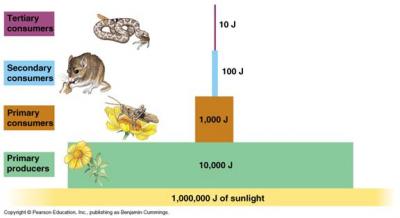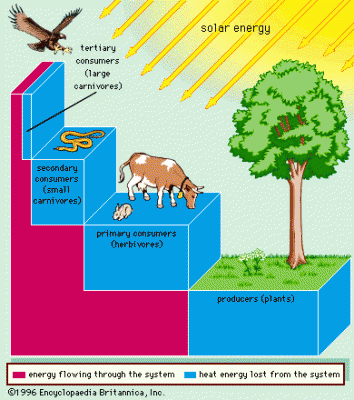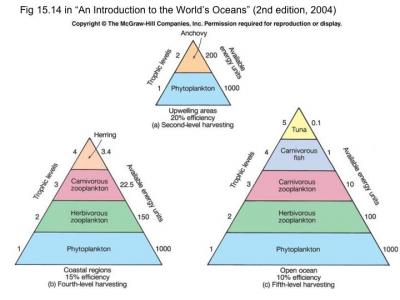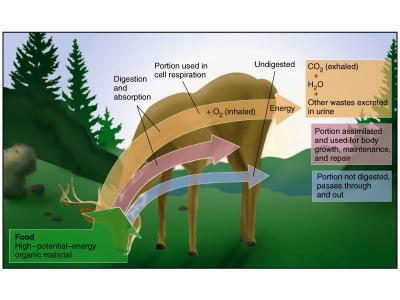
Food is a system of energy transfer. The main source is the sun (other than a few interesting Chemosynthesis creatures), and then its all a matter of how many steps away from the sun your meal is.
For instance if you are a plant its pretty straight forward,
(sun -> you)
If you are a cow,
(sun -> plant -> you)
If you are a wolf,
(sun -> plant -> deer -> you)
Being a human (assuming you ARE a human) it can get really interesting depending on how you get your food, but lets simplify:
carnivore (meat only) = (sun -> plant -> animal -> you)
omnivore = [(sun -> plant -> you) + (sun -> plant -> animal -> you)]
vegetarian = [(sun -> plant -> you) + (sun -> plant -> egg/cheese – >you]
vegan (plants only) = (sun -> plant -> you)
So like any energy transfer system a little bit is lost at each stage. The plant absorbs the sun and wastes some of it growing, and when we the cow eats the plant it wasts some of it growing and so on until it gets to your mouth. That means it takes more energy to produce X number of cow calories than it does X number of vegetable calories.
Cleary, eating vegetables is more efficient. It not only takes more energy from the sun to make that cow calorie, but it also takes more land to grow the crops that cow ate, it takes more water, it takes more oil, and it takes more chemicals (most farms don’t grow organic feed crops), and you feed less people.
Where is all this leading us? Should you all go out and become vegans, maybe but if you are not ready for that sort of change you can do something else.
There is a movement to push the old PB&J (peanut butter and jelly) sandwich. The fine people at pbj campaign make a fine argument for why switching a couple of ham sandwiches a month to pb&j can make a good bit of difference in the world.
Here is just a taste (sorry) of what you can achieve by switching.
A PB&J will slow global warming.
Next time you have one you’ll reduce your carbon footprint by saving the equivalent of 2.5 pounds of carbon dioxide emissions over an average animal-based lunch like a hamburger, a tuna sandwich, grilled cheese, or chicken nuggets.
That’s about forty percent of what you’d save driving around for the day in a hybrid instead of a standard sedan.
If you were going to have a ham sandwich or a hamburger, you save the equivalent almost 3.5 pounds of greenhouse gas emissions.
A PB&J will also save water.
That’s about 280 gallons of water over the hamburger. To put this in perspective, three PB&Js a month instead of hamburgers will save about as much water as switching to a low-flow shower head.
A PB&J will save land.Have a PB&J and save 12 to 50 square feet of land from deforestation, over-grazing, and pesticide and fertilizer pollution.(via)
Visit their site for more interesting ways the old pb&j can help the world.
There are other things you can do. (in order of importance)
Eat local:
The average food item in the American market has traveled over 1000 miles to get there. Eating local saves a lot of oil on transport, and makes the local economy stronger. Check out that farmers market and make your mouth and someones wallet happy. Paying a local farmer a couple cents more for an apple means that farmer might get 80 – 90% more for that apple. Large food companies take a big cut out of the final price of our food. Not much of that money makes it back to the farmer. Buying local means that farmer will have more money to come to your business.
Even if you eat meat, eating local meat will help reduce oil used in transport. My father is a small town butcher and he can testify to the fact that large meat plants do horrific things to meat, get it local and know what is going into your cow.
Eat more vegetables:
Your mother was right, you should eat your vegetables. Its good for you and the planet. You will notice your waste line looks better as does your skin, your hair and your mood.
Eat organic:
Organic foods are produced without artificial chemicals and fertilizers, hence they use less oil.
If you are feeling a bit crazy, trying going vegetarian for a week. You might like it, I know I did. I lived with a couple of vegetarians in college and it was just easier to eat what they ate, over 5 years later I don’t miss meat at all.
If you absolutely can’t live without meat, I would suggest raising your own. If you have the space raising chickens is not as hard as you would think. If you live in a big city, some farmers run programs where they will raise animals for you and even do the slaughtering, all you have to do is pay your money and pick up your meat. If you go this route make sure you get to know the farmer before hand and pick one with farming practices that are gentle on the earth.
I have slaughtered chickens and can tell you that it gives you a whole new appreciation for where your food comes from. If the idea of raising and then killing an animal for your food is revolting to you, and you still eat meat you might want to spend some time thinking about why that is. Home grown meat can be a great way to get more in touch with nature and at the same time control what kind of weird stuff goes into that meat.
There are lots of things you can do to lessen the amount of energy you use to get your food, from eating some pb&j’s a couple of times a month, to changing the way you get food, to changing WHAT you eat all together. If you have any tips make sure to leave them in the comments. Thanks.



The Planeticians
A Perspective that All Humans on Planet Earth Need to Consider
I am reminded of the words of a US/Chinese astronaut on seeing planet earth from space: A Chinese tale tells of some men sent to harm a young girl who, upon seeing her beauty, become her protectors rather than her violators. That’s how I felt seeing the Earth for the first time. I could not help but love and cherish her–Astronaut Taylor Wang, China/USA.
Astronaut Taylor Wang captures the commitment of planeticians-to protect and cherish the earth and not violate her in any manner. Planeticians see themselves first and foremost as citizens of planet earth. Their focus is the planet as a whole, not this or that political, economic, ethnic, or religious group. Planeticians are committed to improving the quality of life for all inhabitants of the planet. This quality of life depends directly on the interconnected and interdependent systems of land, air, and water and how all humans use and manage these systems. Damage or violence to the systems anywhere impacts all systems and all life as we are seeing in the growth of carbon dioxide emissions and the effects on climate change and global warming.
The key to the success of any undertaking to improve the earth’s quality of life is the understanding that planet earth is a shared spaceship adventure. All inhabitants of earth-all human, animal, and plant life travel together through time and space aboard this spaceship at the high-speed of 67,000 miles or 107,826 kilometers per hour. All humans are crammed onto this huge traveling home for a ride that is often perilous because of the calamities that are experienced on our planet from time to time. These calamities, some brought about by people, include wars, famines, floods, earthquakes, epidemics, genocides, hurricanes, typhoons, tornadoes, tsunamis, and the daily death and suffering that humans inflict on each other. Then there are the less obvious calamities that are also very corrosive of the quality of life on the planet such as pollution, poverty, the arms race, poor health care, discrimination, and prejudice.
To contribute something worthwhile to improving the quality of life on the earth spaceship, we urge each individual person to transcend the limiting and often harmful confines of her/his cultural, political, social, and religious systems of thought and practice, project themselves outside their environments and try to see the earth as Astronaut Taylor Wang saw it from space. We know that every person yearns to live a life that is worthwhile, and one sure way of doing that is to become a true planetician, and make the betterment of the planet a first priority.
The concept of shared traveling on planet earth and hence shared responsibility for conditions on the planet is extremely difficult to get across to our fellow citizens of the planet (Al Gore and Kevin Wall with their Live Earth Concerts have pioneered a way).
Hence, our first big challenge is to get all peoples on earth to transcend their own closed worlds with their separate political and religious allegiances, their separate and unequal cultural and scientific advancement, their histories of hot and cold wars with each other, their arms races, their development and use of weapons of mass destruction, their use of suicide missions against each other, and consequently the buildup of deep mutual distrust handed down from generation to generation, and come together and reach consensus on how best to work in harmony for the common good of their spaceship-planet earth. This is planet earth’s greatest challenge, requiring hard choices, change, and commitment from all humans to be care-givers to an ailing planet.
As we climb that difficult mountain demanding sea changes in attitudes and behavior, we need to hammer out a blueprint for the betterment of all inhabitants of the planet going forward. And thanks to the Internet, we have the tools to succeed. We have at our disposal all the information collected over the centuries in our libraries; the findings of our many research institutes; the writings, insights, and dreams of scientists, scholars, and ordinary people across the planet; and the necessary communication tools. And we have at our fingertips the many search engines of the Internet system to access the vast reservoirs of information and knowledge that we have accumulated.
We would also want deliberations on a blueprint for the betterment of our planet to be interactive, so that the entire planet is directly involved in fashioning the outcomes of any deliberations and corrective actions that need to be taken. To that end, we would want our deliberations to have total visibility to every human being on the planet-broadcasted across the planet using all media including newspapers, blogs, television, and radio with opportunities for feedback and input from readers, viewers, and listeners. To achieve this we need resources. We need the participation and support of philanthropists, media organizations, and national and international organizations and their networks, as well as the participation and support of each and every human on the planet. In the interests of full visibility, total openness, transparency, and interaction, we want deliberations conducted before live audiences at various venues around the planet. We will rely heavily on the Internet as a principal tool in gathering and disseminating information and feedback as well as in fostering total openness and transparency.
Happily, we are informed by our best scientific minds that our miracle spaceship-planet earth-has the raw materials, the natural resources, and in this year 2007 the technology for all its inhabitants to enjoy a life of quality. But we are also very much aware that a shared quality of life is not now actual, but a dream to be realized. All humans across the planet, the rich and poor alike, have hitched rides on this spaceship for very short periods of time. And the challenge during our short ride on the planet is to contribute to the development and enrichment of the planet’s quality of life.
To get started, we invite people everywhere at all levels to get involved through discussions and actions to contribute to the betterment of the planet. We invite all schools from kindergartens to universities, all churches and the many groups within each church, all neighborhood groups, all community and social organizations, all local, regional, and national government organizations, and all international and global organizations to become actively involved, for it is going to take the combined efforts of all caring humans, young and old, to effect change for an improved quality of life for all.
If the above perspective interests you, please pass it on to your friends and associates with the request to pass it on to their friends or have them copy and paste this URL to their browser: http://www.planeticians.com-a.googlepages.com/home. If you have comments or ideas on how to proceed with this undertaking, please email them to: ajmeagher@planeticians.com or visit the website: http://www.planeticians.com. Much thanks for any input to this undertaking, which we hope will grow to include all humans on our planet. A journey of a million miles begins with one step! Your step is a critically important contribution.
I just used some of yourpics and left a link to my blog actualy… check it out you might like it…
great blog!
This is awesome, I really enjoyed it and will be posting it all over the place. Thank you!
Wow – lots of graphs – extremely intellectual.
Bottom line people you can study grapha all day until the cows come home but unless you take some action, nothing will happen.
101 Practical things you can do today!
Nothing will benefit human health and increase chances for survival of life on Earth as much as the evolution to a vegetarian diet.
Albert Einstein.
Maybe, just maybe, the answer should be population control, targeting the source of the problem rather than attempting to micromanage our way out of overutilization of resources.